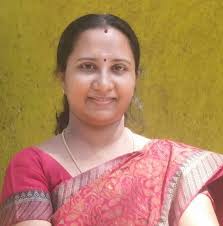Aarthi Rathna R, Assistant Professor At School Of Excellence In Law, Tndalu

Interview conducted by Five as a part of her Campus Leaders Program.
DR. R. Aarthi Rathna is an Assistant Professor at the School of Excellence in Law, TNDALUwith over nine years of teaching experience. She graduated with a Bachelor’s degree in Law from Madras Law College (2006) and completed her LL.M. in Intellectual Property Law from Tamil Nadu Dr. Ambedkar Law University (2009).
Her academic contributions include publications on Blockchain Technology, Artificial Intelligence, Human Rights and IP, Patent Poolingand Personal Laws. She has presented papers at various national and international conferences and has coordinated numerous seminars, workshops, webinarsand cultural events.
DR. Rathna has delivered special lectures as a resource person at institutions across Tamil Nadu and Karnatakaincluding sessions for IPR cells, Anna Administrative Staff Collegeand the National Commission for Women, New Delhi. She has also served as Associate Editor for the Handbook on the Consumer Protection Act, 2019 and the Handbook on Product Liability.
What inspired you to specialize in IP?
In early 2000’s IPR was an emerging and challenging field which inspired me to explore and specialize in this growing domain of law.
Could you share some challenges and rewarding experiences you have encountered while teaching IPR to law students?
Definitely there were times where I realized that students often tend to confuse the legal and technical part of IP. The laws are very clear and there is a perfect bifurcation. But, at times the technical aspects of IP often overwhelm the students and that’s where I play my role and make them realize that the law is unambiguous and IP is not some rocket science.
As someone who graduated from the prestigious Madras Law College, how did your student experience shape your academic experience?
The period when I was pursuing my law school, the college was not actually at its best. Often, we learnt things on our own which was obviously difficult. A lot of hard work was required from my end to learn the law. Back then, it was also not a technology savvy period, nevertheless I worked for my degree and finally it bore fruit.
How do you approach research in emerging areas like block chain and AI in relation to IP law?
Initially I had to take a three-year break from my career for personal reasons. Maintaining a balance or keeping a track of the developments in the field almost felt impossible. I took my time to rewind and understand the basics of IP and teaching really helped me to learn from the scratch.
After studying the subject, I came to realize and understand the existing gaps in the present legal system. By staying updated and strengthening foundation, I believe anyone can maintain a balanced approach especially in the evolving areas of IP.
What was your experience like while contributing to the Tamil Edition of the Consumer Protection Handbook, especially given its release by the hon’ble CM?
I always desired to contribute something to the general consumers and public. When the Consumer Protection Act, 2019 came into effect I was given an opportunity with the support of the University to draft a handbook which was released by the Ministry of Consumer Affairs, Government of India.
Later the Tamil version of the same was released by the Hon’ble Chief Minister M.K. Stalin on the eve of silver jubilee of our university.
Do you encourage law students to write and public research papers early in their academic journey? If so, how should they begin?
I do encourage law students to write research papers and attend such conferences dealing with interdisciplinary and multidisciplinary approaches to law.
However, I don’t personally believe it is everyone’s cup of tea to write a research article or academic paper. It is preferable to first study and learn the subjects initially, strengthen the basics of law and then opt for research papers and publications.
What aspired you to pursue academician?
I don’t know. But I should not say so. From my early school days, I had the habit of teaching my classmates and friends whatever I learn. I believe teaching has been an inherent quality within me. During my college days, I took tuition for CBSE students right from my first year till my final year.
I learnt the basic English grammar from class I books and honed my language skills. Since, I hailed from state board, I had to speak sentences to myself before I speak to others. My growth has been gradual however, I made progress.
Coming back, this habit of teaching people really inspired me to pursue my masters in law (LLM) in IPR. Then later, I started off my teaching career as an academician.
In your view, how is the legal landscape in India evolving in terms of IP protection when compared to global practices?
I actually do not feel satisfied with the current IP regime, focusing more on commercial exploitation and individual interest. There is a consumer welfare and public rights (utilitarian) perspective which is often overlooked by the State. The set standards are very high for obtaining the patent.
I don’t think the benchmark will ever be lowered. Yet utility patents shall also be given prevalence since IP is not only concerned about commercial exploitation or economic benefits to the State but also the overall consumer interest as well.
Lastly, what legacy or impact would you like to leave as a professor of law?
I personally feel this generation law students sometimes fail to appreciate the value of law seats. The culture in law schools is evolving and the students fail to understand that there is something called public welfare but rather they focus only on personal growth and development.
Students must first give or contribute something to the society and must know something in everything. In those days, we as law students ensured to offer something to the community that nurtured us.
Also, I just want my students to fill the gaps in the field by contributing to the academia. I strongly believe they will offer valuable insights and findings to this noble field. This is the kind of legacy or impact I want to leave behind when I conclude my academic journey.
Disclaimer: Interviews published on Lawctopus are not edited thoroughly so as to retain the voice of the interviewee.
This interview is a part of our Star Interview series, conducted by the Campus Leaders at Lawctopus. Stay tuned for more!

